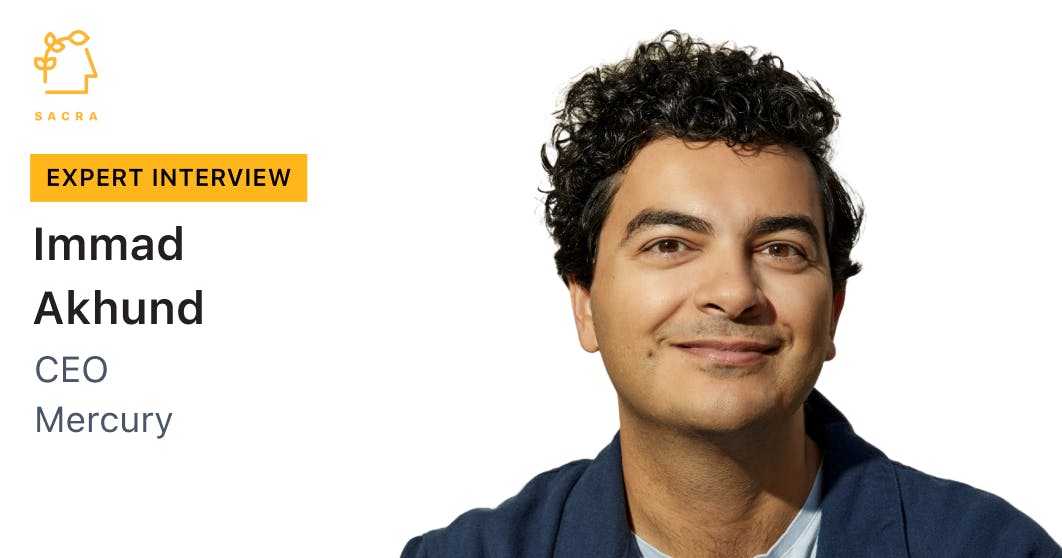Immad Akhund, CEO of Mercury, on the business models of fintechs vs. banks
 Jan-Erik Asplund
Jan-Erik Asplund

Background
Immad Akhund is the CEO of Mercury. We talked to Immad to learn more about Mercury's business model vs. that of a Silicon Valley Bank, how Mercury thinks about its ideal customer segment, and how Mercury is set up to be more fault-tolerant than SVB.
Questions
- How should startups think about treasury management at various stages: the $1 million seed stage, the $10 million Series A, and the $100 million Series C type company?
- How does a sweep network work, and what are the similarities and differences between using a sweep network and manually diversifying your funds across multiple banks?
- There's this perspective out there like, "Hey, don't open a bank account at Mercury or another neobank—use one of these ‘too big to fail’ banks." What does this perspective get wrong about Mercury?
- Let's assume that it is good risk mitigation practice to make sure you have one bank account open with a G-SIB bank, but you want to use Mercury on a day-to-day basis. Is there a product concept where Mercury facilitates you having an account with an underlying type bank like that without having to actually use it?
- When SVB failed, there were multi-day delays in accessing funds due to FDIC insurance, causing issues with meeting payroll on time. If Evolve or another partner bank were to fail for Mercury, what would that experience be like?
- Can you discuss Mercury's business model as a tech layer compared to SVB as a bank? How does your business model differ in terms of robustness and how do you think about it?
- Can you speak about Mercury's revenue mix and future revenue streams?
- SVB was heavily indexed on the startup ecosystem. How have you thought about and diversified the customer base to create more resilience? On the flip, do you think you want to double down on the ecosystem and go after VCs and other ecosystem participants as well?
- Partner banks like Evolve tend to work with other fintechs. How important is it to grow and diversify the partner bank network? And do you think that's actually some defensible moat against competition? And on the flip, should depositors be actually looking and scrutinizing the underlying bank partners of a neobank?
Interview
How should startups think about treasury management at various stages: the $1 million seed stage, the $10 million Series A, and the $100 million Series C type company?
I had a lot of people ask me this question over the weekend. At the time, we only had $1 million in FDIC insurance. Now, we have $3 million with our banking partner Evolve Bank & Trust.
I'd recommend putting your operational money in a working bank account below the FDIC insurance limit. With $3 million FDIC insurance, most companies don't need much more than that in their operational bank accounts. There are obviously exceptions for larger companies, but for most, $3 million is more than enough. I suggest putting the rest in US government T-Bills, which we give access to via Mercury Treasury. It's a Vanguard Mutual fund with short-term US Government T-Bills.
That's a safe arrangement, which is why we launched Vault, a product that recommends this setup. The only other thing I'd recommend is setting up at least one other bank account, just in case, and having some money in it. While I believe our Mercury arrangement is safe, it's still prudent to follow this advice.
For smaller startups with less than $3 million, as long as you're below the FDIC limit, you don't need to think much more about it. If you're at a big bank, consider choosing one that provides extra FDIC insurance like Mercury does. Treasuries become more of a yield consideration rather than a safety one, and people are generally more focused on safety right now.
If you've raised $4 million, you'd likely have an arrangement between the FDIC and treasuries. With $10 million, the arrangement is fairly similar. At $100 million, you get into corporate treasury management and asset management, and we have a partner that can help. You might allocate $20 million for use in the next six months and put the remaining $80 million into a laddered securities and bonds portfolio. We have a partnership with Morgan Stanley to facilitate that.
How does a sweep network work, and what are the similarities and differences between using a sweep network and manually diversifying your funds across multiple banks?
Mercury has a relationship with Evolve Bank & Trust. When we create a bank account, we'll give you one account number and routing number at Evolve. The money hits that, and daily, the sweep network, managed by Evolve in this case, makes a determination to deliver on the goal of $3 million FDIC insurance. If you have $500k, they need at least one other bank to sweep $250k to. They make this determination and have an accounting of it. At the end of the day, they'll either send or pull money from an omnibus account at these other banks.
The omnibus account at these other banks is a single account on the ledger, but it's an FBO (For the Benefit Of) account. The money is held in the name of these organizations, and that's how it gets FDIC insurance.
Sweep networks aren't new; they have existed for decades. Some banks want deposits and will buy them, while others have too many deposits and sell them. This is due to banks being more specialized, with some excelling at collecting deposits and others focusing on specific types of loans. Sweep networks help manage the flow of deposits between these banks.
The whole problem with SVB was about this disparity. They had tons of deposits come in, but they couldn't lend them out. In 2021, there were just way more deposits than there were opportunities to lend and they wanted to make returns on them anyway, and they ended up doing these long term mortgage-backed securities (MBSs), and the rest is history.
There's this perspective out there like, "Hey, don't open a bank account at Mercury or another neobank—use one of these ‘too big to fail’ banks." What does this perspective get wrong about Mercury?
It's reasonable to think about how to make your money safe. The Vault product is our answer to that. And we definitely have a lot of customers that feel good about it. There might be other people that are like, "Okay. Even with FDIC insurance, I'm not happy. I'd much rather be at a really big bank," which is reasonable. Right now, in this very short term time period, there's all this worry about whether there's going to be a systemic bank crash and whether SVB is just the first domino of that.
At the end of the day, there's a reason that people don't really like the big banks, and there's a reason SVB existed—even though maybe I question how great their product was—but their service did really understand startups and VCs, and they delivered a great experience. And there's a reason Mercury exists. Big banks are just not suited to understand the specific space and deliver a great experience.
There's a lot of people in the startup space that are nomadic nowadays. They don't want to go into a bank branch to do things because some percentage of the time, they're not even in the US but they're running a US startup, whether it's from Bali or Mexico, whatever it is. And that's something that a big bank would never understand. They'd be like, "Oh, you want to do a wire? Sorry, we need you to come into the bank branch to get this done," and et cetera. So that's just one little example, but Mercury is built on 1,000 examples like that. It's just very frustrating for people to have that big bank experience, whether it's at signup or sending something or fraud or just using a great website to do things.
Let's assume that it is good risk mitigation practice to make sure you have one bank account open with a G-SIB bank, but you want to use Mercury on a day-to-day basis. Is there a product concept where Mercury facilitates you having an account with an underlying type bank like that without having to actually use it?
I sympathize with that need. It's a little tricky. It's ACH pulls. So we do let you connect your Plaid account and we do let you pull money from another bank account. Pieces of it exist. It's hard to make it a completely seamless experience because yeah, there's only so much we can do without being the bank itself, but yeah. It wouldn't be too bad. Depends what they want to be able to do with the other bank. If they want a fully transactional experience, I think that's pretty hard to deliver. If they're mostly using Mercury for their operational stuff and putting some of their money in as a backup thing, then I think that's not too bad to get right now.
When SVB failed, there were multi-day delays in accessing funds due to FDIC insurance, causing issues with meeting payroll on time. If Evolve or another partner bank were to fail for Mercury, what would that experience be like?
That's a good question, and hopefully, no one will ever have to face it. Currently, we have two partner banks, Evolve Bank & Trust and Choice Financial Group, and plan to add a third by the end of the year. If an issue arises with one bank, we can quickly set you up with another one, even at scale and automatically, within minutes.
In the case of a failure, the FDIC is actually quite fast in addressing such situations. We would take care of everything for you, so you don't need to sign up elsewhere, and you can continue using the same interface. We'd make it easy to transfer money across but would need the user's consent. If the funds weren't fully protected, that would be a different situation altogether.
One advantage of partnering with fintech banks like Evolve is that they rely less on lending. A significant portion of their revenue comes from non-interest bearing sources, making them more tolerant as a bank. Traditional banks depend heavily on lending and loans, which can put them at risk.
Can you discuss Mercury's business model as a tech layer compared to SVB as a bank? How does your business model differ in terms of robustness and how do you think about it?
We currently have four revenue streams.
One is we take deposits and we'll sweep them to our bank. Because we do that and thankfully interest rates aren't zero now, those banks give us a piece of the revenue that basically is generated on those deposits. But we don't loan against them—the banks do what banks do, and they just give us a revenue share from that.
We also have both a debit card and a credit card, and we get interchange on that.
We actually have a reasonable amount of international wires and forex, and we do charge a fee for that.
Lastly, we have a venture debt lending program, and we get some portion of the interest rate and the warrants that we have on that lending program.
Can you speak about Mercury's revenue mix and future revenue streams?
We don't talk about revenue mix, but we've been profitable since September and our plan is to continue like that.
We believe in building a long-term sustainable company. One of the problems with 2021 was that it made fintechs not really care about building a company with strong unit economics and one where the business model made sense. We've always thought about it like that because I've been doing startups for a long time and I've never liked relying on VCs too much.
In terms of new products and new revenue streams, there's a couple of things in the mix, but nothing to announce right now, but they're cool. We'll definitely let you know when they're out.
SVB was heavily indexed on the startup ecosystem. How have you thought about and diversified the customer base to create more resilience? On the flip, do you think you want to double down on the ecosystem and go after VCs and other ecosystem participants as well?
I think it's really important to understand who you're serving and be quite deliberate about it.
When we were launched, if you raised a million dollars, it was hard to get an SVB bank account. You could hardly even go to the website and just sign up. You'd have to jump through some hoops. If your VC introduced you, they'd give you a bank account straight away, but they didn't really want small companies.
We are definitely more diversified than SVB, serving small startups, bootstrapped companies, and those that aren't venture-backed.
We've also had a ton of growth in e-commerce. That's our second-biggest segment. Our third-biggest segment is consultants. They tend to be adjacent to tech, but freelancers, design agencies, marketing agencies, all of those kinds of businesses.
Our fourth-biggest segment is investors, which is about 5% percent of our customers. Any US business can sign up, but we do think about building products, marketing and distribution towards those segments specifically.
As to your last question, there's definitely been a big push from the VC community to say, "Hey, what about us?" Actually, a lot of the things that make big banks annoying are especially annoying to VCs. VCs involve a lot of money moving in and out. Your LP will fund a $5 million capital call and then you'll send out $5 million to make an investment. It's very easy to understand the behavior if you understand investors. You're like, "Okay, that's exactly what I would expect from this bank account."
If you're a big bank and you have a few investors, every time one of these wires comes in, they'll be like, "Flag that account, flag that account." It's not a very pleasant experience.
Obviously, if you're a very, very big VC fund and you've got some private wealth management type of thing, you'll still have an okay experience, but there's definitely a pretty large set of funds that wouldn't.
Partner banks like Evolve tend to work with other fintechs. How important is it to grow and diversify the partner bank network? And do you think that's actually some defensible moat against competition? And on the flip, should depositors be actually looking and scrutinizing the underlying bank partners of a neobank?
I think there is a set of people that will do that, but most founders are busy running their business. The last thing they want to be doing is scrutinizing the balance sheet of a bank, whether it's SVB or any other bank, so I just don't think that's realistic behavior.
I think it's on Mercury to educate people: "This is our FDIC insurance. This is how you should put your money. As long as you do the right thing and we educate you on why it's the right thing, you're good."
We've always tried to be really transparent and open and communicative with people, and people appreciate that. There is now some level of trust people have with us and how we talk about things and our brand. Obviously, we have to continue to earn that trust every day.
I don't think everyone's going to become super educated about banking and the sponsor bank ecosystem and who's good and who's bad. At the end of the day, if it comes to that, then you've failed.
Disclaimers
This transcript is for information purposes only and does not constitute advice of any type or trade recommendation and should not form the basis of any investment decision. Sacra accepts no liability for the transcript or for any errors, omissions or inaccuracies in respect of it. The views of the experts expressed in the transcript are those of the experts and they are not endorsed by, nor do they represent the opinion of Sacra. Sacra reserves all copyright, intellectual property rights in the transcript. Any modification, copying, displaying, distributing, transmitting, publishing, licensing, creating derivative works from, or selling any transcript is strictly prohibited.






